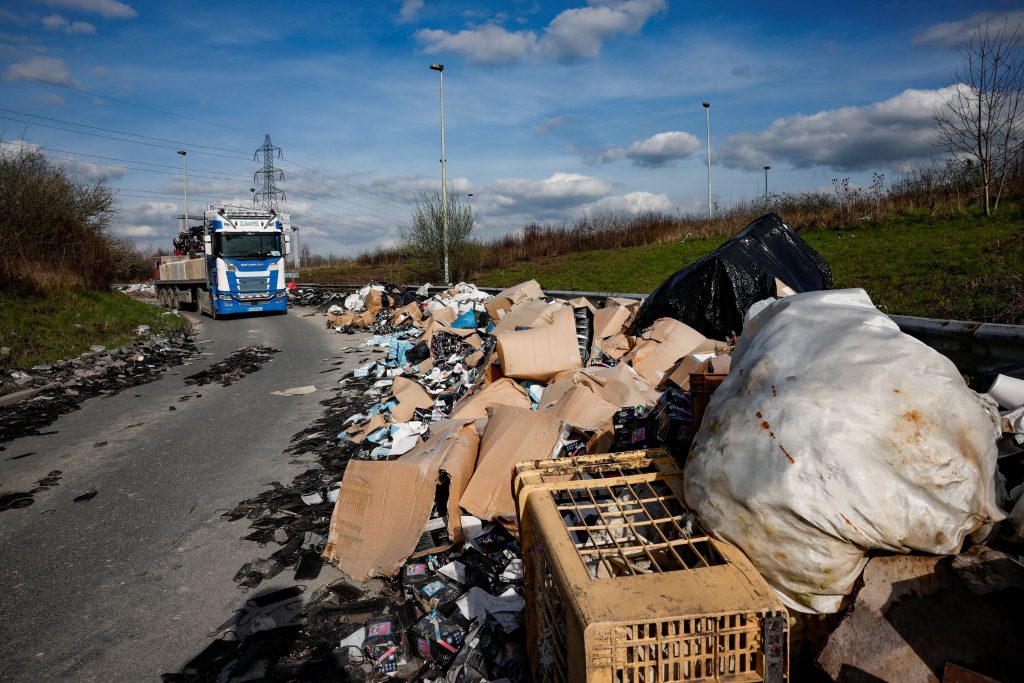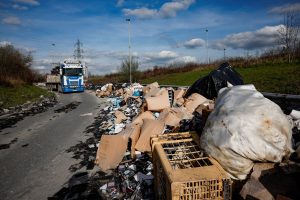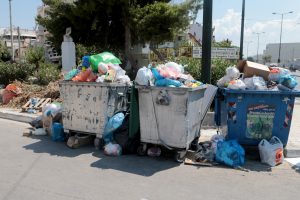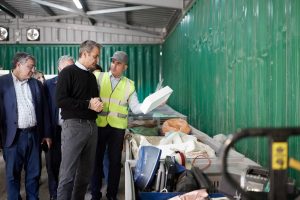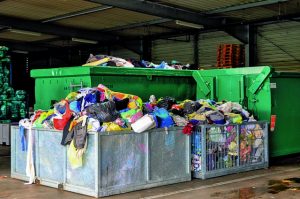In the quiet hills of Tilos island, the rhythmic clatter of bins being sorted and rinsed echoes a community’s commitment to zero waste. On this small Aegean isle, residents meticulously separate their waste into multiple categories, and have traded a traditional landfill for a state-of-the-art recycling center, reportedly helping the island achieve an 86% recycling rate.
Elsewhere in Greece, the picture is far less hopeful.
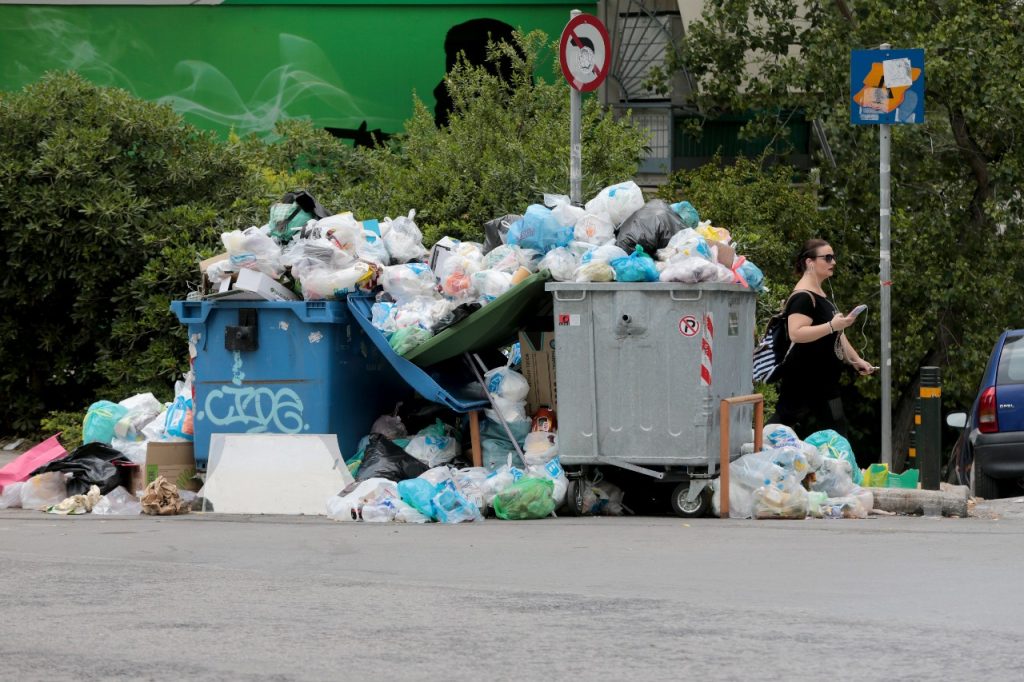
Trash bins on a street in downtown Athens. Athens New Agency/ Panagiotis Saitas.
Despite European Union directives championing a circular economy, Greece remains one of the bloc’s underperformers. Eurostat says the country generates around 31 million tonnes of waste annually, which includes construction and industrial waste, and approximately 80% of the 5 million tonnes of municipal waste is consigned to landfills. Recycling rates, on average, hover between 16-20%—a far cry from the EU’s target of 55% by 2025.
But Greece is not alone.
Globally, more than 2.3 billion tonnes of waste are produced each year, while 2.7 billion people still lack access to basic waste collection, according to the United Nations Environment Programme (UNEP). Even across the EU, the road to zero waste has proven rockier than anticipated. While countries like Germany and Austria boast minimal landfill usage, others—including Malta, Romania, and Bulgaria—grapple with aging infrastructure, weak governance, low public engagement, and low recycling rates.
In 2018, Justine Maillot of Surfrider Foundation Europe called the European Parliament’s plastic ban vote “historic.” But the EU has struggled to keep pace with its ambition since then, and countries like Greece enforce the ban inconsistently.
Europe’s Ambition, Unevenly Applied
The EU’s Circular Economy Action Plan aims to transition Europe to a circular economic model which minimizes waste by keeping materials in use for as long as possible through reuse, repair and recycling. Unlike the traditional linear economy of “take, make, dispose,” a circular approach designs waste out of the system entirely. While “zero waste” is the goal, circularity is the mechanism to get there.

Repair and resale platforms drive sustainability in fashion’s circular economy.
As part of this goal, the EU is striving to make all packaging reusable or recyclable by 2030 and new regulations are transforming how textiles, electronics, and plastics are designed and disposed of, pushing zero waste into the mainstream.
Still, there is a big gap between those EU countries ready to work on circular economy and others, like Greece, which are struggling with basic infrastructure. As an example of this, in 2022, the European Commission referred eight countries, including Greece, to the European Court of Justice over waste mismanagement. Greece alone has racked up over €60 million in fines since 2015 for failing to shut down illegal dumps and create a national hazardous waste disposal network. In light of this, circularity sounds more like a science fiction novel.
‘Zero Waste’ it is the diversion of at least 90% of waste from landfills or incinerators. It is based on: reduce, reuse, recycle, and regenerate.
The Cost of Inaction
Economically, the stakes are high. A WWF report estimates that Greek municipalities spend around €2 billion annually on waste collection and landfill disposal. While the government has pledged to eliminate the conditions that trigger landfill fines by 2026, experts argue this is only a starting point.
According to a WWF Greece report, shifting to a zero-waste model—focusing on prevention, sorting, composting and reusing—would reduce costs over time while boosting environmental and public health outcomes. UNEP has reached similar conclusions at the global level.
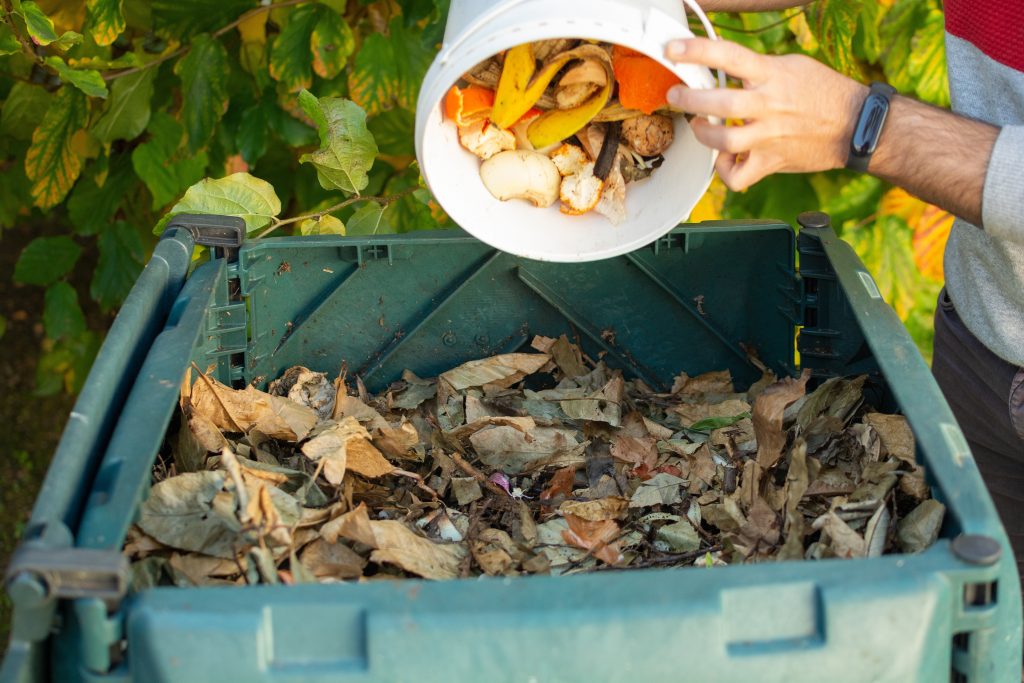
Leading the way: Japan, South Korea, and San Francisco set global standards in waste recycling and composting.
Meanwhile, UNEP also warns that the societal costs of inadequate waste management are five to ten times higher than the cost of doing it right. These include increased disease, flooding, marine pollution, and greenhouse gas emissions—particularly methane, which accounts for 3% of global emissions and is largely tied to landfills.
Pilots, Politics, and the Path Forward
Back on Tilos, the “Just Go Zero” initiative—launched by waste company Polygreen with local authorities—has earned applause from the EU and UN. A Dubai investment firm showed interest in licensing the model for one of its communities, and the Greek government previously stated its intention to replicate the Tilos model in 15 more communities–something that has not yet materialized.
But experts caution against over-reliance on pilot projects. While they highlight what’s possible with the right vision and coordination, they can also obscure broader systemic inaction. To eliminate landfill fines—by eliminating landfills—Greece must invest in modern infrastructure, establish new holistic systems, and enforce existing laws.
The greater challenge, however, lies in fostering a cultural shift among both Greeks and the country’s millions of annual visitors — from seeing waste as a linear system of disposal to recognizing it as a shared resource that demands active participation to unlock its value.
A Global Wake-Up Call
Greece’s struggles mirror broader global challenges. Even in wealthy nations, per capita waste is rising, and plastics production is projected to triple by 2060. The figures make “zero waste” sound idealistic; fortunately, though, success stories are growing.
Japan says it has achieved an 80% recycling rate, South Korea composts 95% of its food waste, and San Francisco diverts 80% of waste via recycling and mandatory composting. Within Europe itself, Germany, the Netherlands, and Belgium now recycle over 60% of their municipal waste with minimal landfill use.
In celebration of 2025 International Zero Waste Day, the question is no longer whether zero waste is possible, but whether nations like Greece can embed circular thinking into the mainstream before landfills become the legacy of a wasted opportunity.
